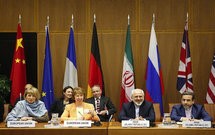 As foreign diplomats arrived in Vienna on July 2 for the sixth round of talks between representatives of Iran and P-5+1 countries, key sticking points remained unresolved.
As foreign diplomats arrived in Vienna on July 2 for the sixth round of talks between representatives of Iran and P-5+1 countries, key sticking points remained unresolved.
Ahead of the July 20 deadline, the most important topics are the future of Iran's uranium enrichment program, concerns about the heavy-water plutonium reactor in Arak and the extent to which the United States and the European Union will roll back sanctions. The P-5+1 is composed of the United States, the United Kingdom, France, Russia, China and Germany, but it is Russia that will be the key player to watch as the talks progress. Moscow wants to improve its relationship with Iran to undermine the potential new balance of power in the Middle East, a balance that would free up U.S. resources and allow Washington to counter Russian influence. While recent Russian outreaches to the Iranians are unlikely to prevent a transitional agreement with Washington in the coming weeks, Iran will continue to exploit the U.S.-Russian split to enhance its negotiating position against the United States.
The formation of a subtle U.S.-Iranian partnership along Russia's southern periphery would run counter to Moscow's primary interests, particularly as the United States assembles a broad network of alliances meant to contain Russia. In order to prevent such an outcome, Moscow has looked for opportunities to complicate and even sabotage the ongoing P-5+1 talks, following up on recent proposals by providing Tehran with alternatives to a deal with Washington.
Russia's most recent move was an unscheduled June 30 meeting between Russian Deputy Foreign Minister Sergei Ryabkov, the lead Russian negotiator in the nuclear talks, and Iranian Deputy Foreign Minister for Arab and African Affairs Hossein Amir-Abdollahian. Although announcements ahead of time referred to the meeting as preparation for the Vienna negotiations, media sources in Tehran reported that Ryabkov expressed strong support for Iran's nuclear program. Ryabkov's post-meeting statements said that no restrictions should remain on the Iranian nuclear program following negotiations, which would likely be a long and difficult process. His statements of support for Iranian demands are attempts to elicit Russian-Iranian cooperation in the crucial days leading up to the new round of talks.
After the fifth round of talks concluded June 21, Ryabkov said he doubted the viability of a U.S.-Iran agreement, warning that the involved parties would need to pursue alternatives if current negotiations did not remove all the restrictions on Iran's nuclear program. It remains unclear what form such alternatives would take, but the statements signal to Iran that is has options other than the United States.
Russia's attempts to attract Iran are demonstrated by low-level talks that have taken place since January over a proposed $20 billion oil-for-goods exchange. Under the planned agreement, Iran would sell 500,000 barrels per day of crude oil to Russia in exchange for key agricultural products and civilian machinery, thereby effectively bypassing Western sanctions. Russia has also offered to build two new 1,000-megawatt nuclear reactors in Iran.
So far, Iran has resisted Russian advances; Tehran understands that a bilateral agreement with Moscow would not resolve the key challenges facing Iran's financial and energy sectors. In any case, Iranian President Hassan Rouhani and his government are politically invested in the negotiations and have shown few signs that they will abandon the process, which is part of their vision of their country's future.
However, Tehran could try to use Moscow's outreach to enhance its leverage in the P-5+1 negotiations -- something it has done in previous rounds of talks. Tehran hopes to obtain key U.S. concessions ahead of the July 20 deadline. However, its negotiating strategy is limited. The United States knows that previous Russian offers have not dissuaded the Iranian leadership from engaging in negotiations in the past. For its part, Russia will continue its strategy of interference, perhaps making more overt moves in the coming days. Though the current round of talks are unlikely to produce a final settlement, Iran is likely to capitalize on the recent meetings with Russia to press for better terms.
Courtesy : Stratfor (www.stratfor.com)